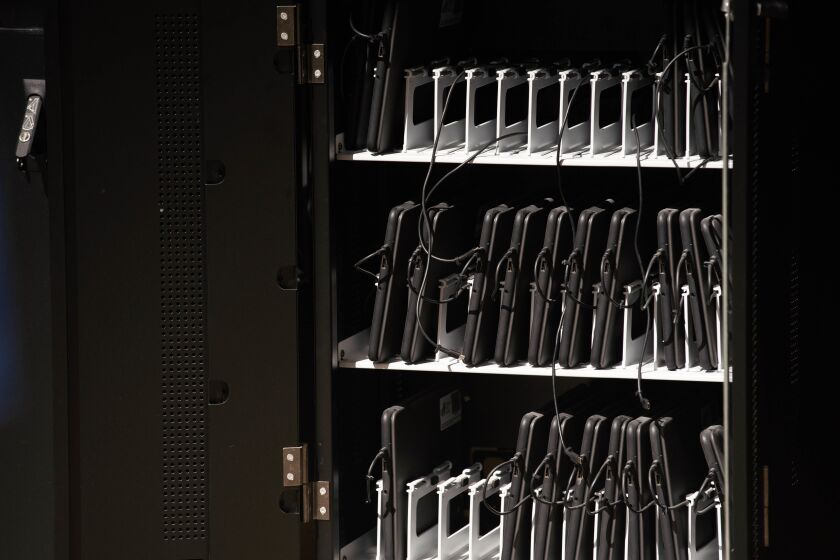Remote learning has brought school home for thousands of Chicago students during the pandemic, turning a living room or bedroom into a makeshift classroom.
But many families worry that means giving up home privacy for their children’s access to lessons through technology.
As it turns out, that trade-off might in fact have been happening for the first few weeks of the school year.
An e-learning tool used by Chicago Public Schools essentially gave teachers access to tens of thousands of students’ computer cameras and microphones — allowing them to look into their homes without their permission or knowledge — before the problem was fixed late last month.
CPS has used the technology tool “GoGuardian” to help teachers keep students on track during lessons by granting educators remote access to a limited set of functions on a student’s computer. The application allows teachers the ability to see what students have open on their computer screens, as well as the power to open websites on a student’s laptop, switch tabs, block sites and view browsing histories.
Many parents and teachers have said this access has been beneficial in helping make sure students, especially younger ones, are involved in learning during school hours.
But until recent changes, a teacher could also remotely start a Google Meet video session with a student, leading to a meeting preview automatically popping up on the student’s Chromebook.
That preview would show a live video inside a student’s home taken through a student’s webcam. That meant a teacher viewing a student’s screen using GoGuardian could watch the video preview even before the student had agreed to start the meeting or knew it was taking place.
While CPS spokeswoman Emily Bolton said GoGuardian did not directly give anyone remote control of or access to a camera or microphone, she acknowledged the preview function essentially allowed just that. CPS has since changed the settings that defaulted to cameras and microphones automatically turning on.
“The district takes student privacy concerns seriously and acted swiftly upon learning of concerns from parents about the original default functionality of GoGuardian. With the update, students must manually turn on their audio and video settings to be seen and heard by their teacher,” Bolton said.
She added the district has developed a mandatory information security and privacy training program for all staff, and said the issue only applied to CPS-issued Google Chromebooks and not other district devices such as iPads, which don’t have GoGuardian. The application is not on families’ private computers.
CPS records show the district through the end of August had purchased 52,544 Chromebooks for $15.6 million as part of its efforts to distribute about 130,000 devices to students.
A spokesman with the Los Angeles-based GoGuardian faulted the use of Google Meet for the problem, noting it was Google Meet’s default setting that automatically turned on webcams ahead of the start of a meeting.
“Teachers and students are using Google Meet and other video conferencing services that aren’t necessarily designed with K-12 student security in mind, especially during the pandemic,” the spokesman said. “Once GoGuardian learned of this issue with Google Meet, it created a custom solution to automatically disable Google Meet from enabling a webcam when a student joins a new Google Meet session.”
But Cassie Creswell, who as director of the legislative advocacy group Illinois Families for Public Schools has focused on digital privacy issues at CPS for several years, said the issue signals a host of underlying concerns.
Creswell said remote learning has caused problems such as young children trying to run complex computer programs that they can’t necessarily be expected to understand. That has created the need for tools to solve those issues but has also opened the door to misuse, she said.
“To have a current program have those capabilities and not have it absolutely explicit that that’s a possibility and an issue, and have it explained by the district what the rules are, is very concerning both as a parent and a privacy advocate,” Creswell said.
She added her daughter, a CPS student, was required to sign up for almost a dozen new applications at the start of the school year, and the family wonders where its data is being stored.
“There’s huge questions about what applications are in use, and what those applications are collecting and what’s happening to it,” Creswell said. “I feel like it’s impossible to sort it all out as a parent.
“It’s the Wild West, and it’s very disturbing. It was already like that before the pandemic, and now it’s even crazier, especially because you have even less of an option to decline this stuff now because that’s just how you’re getting your free and appropriate public education.”
Teachers said while GoGuardian can be helpful in making sure kids are indeed doing schoolwork, most have no desire to police their students’ screens.
One teacher at a central area school said she did have one student ask her if administrators “can see if I’m watching Netflix.” But she said she would only check on students if it’s clear they aren’t doing work — like completing a live class assignment.
Otherwise, “I told my students I am not spying on you. We don’t want to know what you are doing. Just do your work.”







